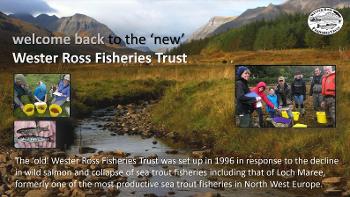‘New’ Wester Ross Fisheries Trust supports revival of wild salmon and sea trout populations
Posted: Wednesday 14 April, 2021 @ 06:11:49

Wester Ross Fisheries Trust is back.
The new WRFT is much like the original and covers the same area as the Wester Ross Area Salmon Fishery Board (WRASFB), from the River Kanaird in the north to the Applecross River in the south.
We will continue to focus on providing independent science-based information and advice for all concerned about the revival, protection and management of wild salmon and sea trout populations within the Wester Ross area. Our work will focus on field surveys and the monitoring of wild fish and their habitats, and on resolving problems in partnership with others.
The new Trust owes much to the dedication of several trustees and administrator Peter Jarosz who have founded the new company and charity following the break-up of the Skye and Wester Ross Fisheries Trust in 2020.
Please click on one of the links below to learn more about Wester Ross Fisheries Trust and some of the challenges:
low resolution for smart phone (7MB) http://www.wrft.org.uk/files/Welcome%20back%20to%20the%20new%20WRFT%20Apr%202021_7MBsmartphone.pdf
high resolution for computer (18MB) http://www.wrft.org.uk/files/Welcome%20back%20to%20the%20new%20WRFT%20Apr%202021_18MB.pdf
We do not underestimate the current pressures facing wild fish and associated challenges. These include degradation of freshwater habitats in some river systems, changes in marine ecosystems, and the infestation of wild salmon and sea trout by parasitic sea lice from salmon farms.
Levels of farm salmon production around adjacent parts of the Isle of Skye and mainland increased greatly during the period 2010-2020 with several new farms with 2000+ tonne biomass consents. Larval sea lice which disperse away from these new farms will add to the existing threats to wild salmon and sea trout populations in Wester Ross and as far away as west Sutherland.
To the list of pressures facing wild fish populations, climate change is becoming an increasing concern. Water temperatures are projected to rise in some rivers during summer months to levels where juvenile salmon will be subject to increasing stress. There are opportunities to restore riparian woodlands along some headwater streams to provide shade and nutritious organic matter to support greater production of salmon and other wildlife.
Wild salmon and sea trout populations will also have to adapt to changes in the sea. Through research carried out by colleagues working in the neighbouring River Conon system, it has also been shown that salmon smolts that are larger and in better condition (fatter) have significantly higher rates of return from the sea to freshwater than smaller thinner smolts.
The restoration of the Loch Maree sea trout fishery and the associated ecosystem, which includes specially protected black-throated diver and otter, remains a primary objective. We will also continue to support and monitor the recovery of sea trout within the ‘Two Brooms’ area and to address challenges for wild salmon and sea trout elsewhere.
Success will depend upon our ability to work with a wide range of individuals and organisations many of whom have overlapping or shared objectives.
Much of our most effective work in previous years has been supported by volunteers and local estates and by generous donations from members and other supporters. WRFT staff also contributed many unpaid hours; some important living things are not just about money.
Former WRFT Biologist Peter Cunningham has been re-employed initially on a part-time contract. There is much experience and knowledge to build on; and plenty of energy and enthusiasm.
We very much look forward to meeting up with former supporters and meeting new ones as soon as the Covid pandemic is over. Our ability to achieve objectives for wild fish depends upon continuing support, both financial and in-kind.
For further information, please contact the new fisheries trust at admin@wrft.org.uk or the biologist at info@wrft.org.uk .